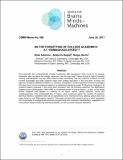On the Forgetting of College Academice: at "Ebbinghaus Speed"?
Author(s)
Subirana, Brian; Bagiati, Aikaterini; Sarma, Sanjay
DownloadCBMM-Memo-068.pdf (713.7Kb)
Terms of use
Metadata
Show full item recordAbstract
How important are Undergraduate College Academics after graduation? How much do we actually remember after we leave the college classroom, and for how long? Taking a look at major University ranking methodologies one can easily observe they consistently lack any objective measure of what content knowledge and skills students retain from college education in the long term. Is there any rigorous scholarly published evidence on retention of long-term unused academic content knowledge? We have found no such evidence based on a preliminary literature review. Furthermore, findings in all research papers reviewed in this study were consistent with the following assertion: the Ebbinghaus forgetting curve [Ebbinghaus 1880-1885] is a fundamental law of human nature – in fact, of the whole animal kingdom and applies to memory of all types: verbal, visual, abstract, social and autobiographical. This fundamental law of nature, when examined within the context of academic
learning retention, manifests itself as an exponential curve halving memory saliency about every two years (what we call "Ebbinghaus Speed"). This paper presents the research group’s initial hypothesis and conjectures for college level education programming and curriculum development, suggestions for instructional design enhancing learning durability, as well as future research directions.
Date issued
2017-06-20Publisher
Center for Brains, Minds and Machines (CBMM)
Series/Report no.
CBMM Memo Series;068
Keywords
retention, learning
Collections
The following license files are associated with this item: